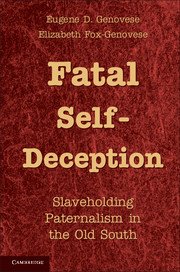7 - Devotion unto Death
Published online by Cambridge University Press: 05 June 2012
Summary
Nine-tenths of the Southern masters would be defended by their slaves, at the peril of their own lives.
– Thomas R. R. CobbGeneral Thomas Williams spoke for many Union officers when he expressed confidence that the Confederacy would face servile insurrections as his troops moved south. A great many Southerners thought differently. In South Carolina during the 1830s, Senator William Smith and Representative William Drayton proudly proclaimed that, if war came, southern slaves would fight shoulder to shoulder with their masters. In the 1840s, Matilda Charlotte Houstoun, the British novelist, reported that sugar planters in Louisiana believed their slaves willing to die for them. Yet those same planters shuddered at the prospect of a war in which England sent black troops to incite slaves to repeat the horrors of Saint Domingue. Houstoun belittled the notion that Englishmen would resort to the barbarism of inciting race war, but she thought that slaves might desert even the best of masters in a crisis.
Armed Slaves: Friends or Foes?
Southerners had selective memories and never did strike a balance between confidence in slave loyalty and foreboding over slave revolt. A historically minded people, they knew that armed slaves and free people of color had helped to tame the frontier, defending farms and plantations against Indian raids. Nathaniel Bacon recruited black as well as white troops during his rebellion in Virginia in 1676. From the early settlements until the Yamassee War in the lower Southeast in 1715–17, probably as many blacks as whites served as front-line troops – until the sight of armed slaves frightened whites as much as the prospect of Indian attacks. During the eighteenth century, South Carolina manumitted slaves who saw battle in militia service. Charles Pinckney, a delegate to the federal Constitutional Convention and afterward governor of South Carolina, extolled slaves’ military contributions to the patriot forces in the Revolution. In New Orleans, free men of color cheered American annexation, and Governor W. C. C. Claiborne lauded their militia. During the War of 1812, Andrew Jackson and Zephaniah Kingsley hailed the performance of free colored militias in Florida, especially against Indians. Counterpoint: George Tucker, Virginia's fine statistician, recorded significant slave flight to the British. In 1818, the antislavery James Turner Morehead, speaking at the University of North Carolina, declared impolitic the establishment of a colony for emancipated blacks in the Northwest, warning that in time it would grow into a formidable hostile force.
- Type
- Chapter
- Information
- Fatal Self-DeceptionSlaveholding Paternalism in the Old South, pp. 131 - 146Publisher: Cambridge University PressPrint publication year: 2011



